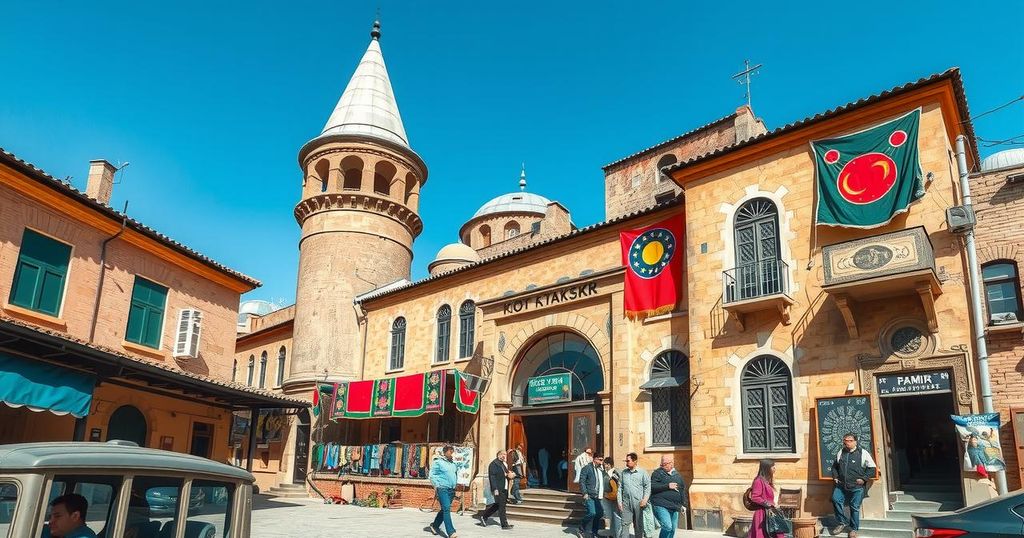Distrust Impedes Peace Process in Turkey’s Kurdish Regions

Turkey faces a challenging peace process in its Kurdish regions, marked by distrust and governmental crackdowns. Recent developments include Abdullah Ocalan’s call for PKK disbandment and a ceasefire, yet skepticism persists among the Kurdish population. Erdogan’s political motivations and historical context complicate the potential for lasting peace and reform.
In Turkey’s Kurdish regions, the ongoing governmental crackdowns and the silence on potential reforms post-conflict are fueling distrust among the Kurdish population. As Turkey grapples with its political and economic stability, the end of a 40-year conflict with Kurdish militants via a fragile peace process remains uncertain, potentially exacerbating social and economic difficulties in the southeast.
Recent dynamics shifted with Abdullah Ocalan’s call for the Kurdistan Workers Party (PKK) to disband, following overtures from an ally of President Erdogan. This unexpected move has led to a ceasefire declaration from the PKK, contingent upon Ocalan overseeing disarmament and a clear political roadmap.
Despite the ceasefire and indications of potential peace, there is significant skepticism among locals, particularly after the arrest of Istanbul’s Mayor Ekrem Imamoglu. This event triggered Turkey’s largest protests in over ten years, reflecting deeper unrest and concerns surrounding the opposition.
Cengiz Candar, a DEM lawmaker involved in Kurdish issues since the early 1990s, noted, “We are entering a minefield. It could go off the rails and end in failure. That’s possible.” Meanwhile, DEM has engaged with Ocalan but reports a lack of transparency from Ankara regarding future reforms necessary for genuine democratization.
President Erdogan commented on the potential expansion of democratic politics post-disarmament, though he has offered little clarity on the peace process. Emerging from the Newroz festival, Kurds expressed hope for a national holiday, aligning with Erdogan’s suggestion, yet longstanding distrust persists due to historical state violence against Kurdish citizens.
In the backdrop of heightened security and military presence, local opinions suggest a disconnect between government promises and Kurdish realities. Many fear the trajectory of peace efforts and the PKK’s ongoing distrust of Ankara, despite the Turkish government’s continued military operations against the group.
Omer Iler, imam of Nebi Mosque in Diyarbakir, reflected on local sentiments of betrayal regarding previous ceasefires. Bahadir, a local retiree, echoed these sentiments, stating, “The state has deceived us many times. Many times the PKK has declared ceasefires, but for nothing.” Access to Ocalan remains uncertain, complicating any disarmament process.
Erdogan is now pursuing broader support for a new constitution that might facilitate his political aspirations in upcoming elections. However, any perceived concessions to the PKK could alienate other sections of Turkish society. Despite resistance, there are signs of potential progress: recent interactions between Erdogan and DEM lawmakers suggest an evolving stance towards peace negotiations.
In summary, while the peace process is marked by cautious optimism due to recent developments, underlying distrust and the complex interplay of political maneuvers present significant challenges to achieving lasting peace in Turkey’s Kurdish regions.
The political landscape in Turkey’s Kurdish areas remains fraught with tension and skepticism despite recent peace overtures. While the PKK’s ceasefire and Ocalan’s directives could foster dialogue, deep-rooted distrust and governmental crackdowns raise concerns about the potential for real reform. Furthermore, Erdogan’s aspirations for constitutional changes amidst electoral pressures complicate the peace narrative, demonstrating that while glimmers of hope exist, challenges remain significant.
Original Source: www.marketscreener.com







